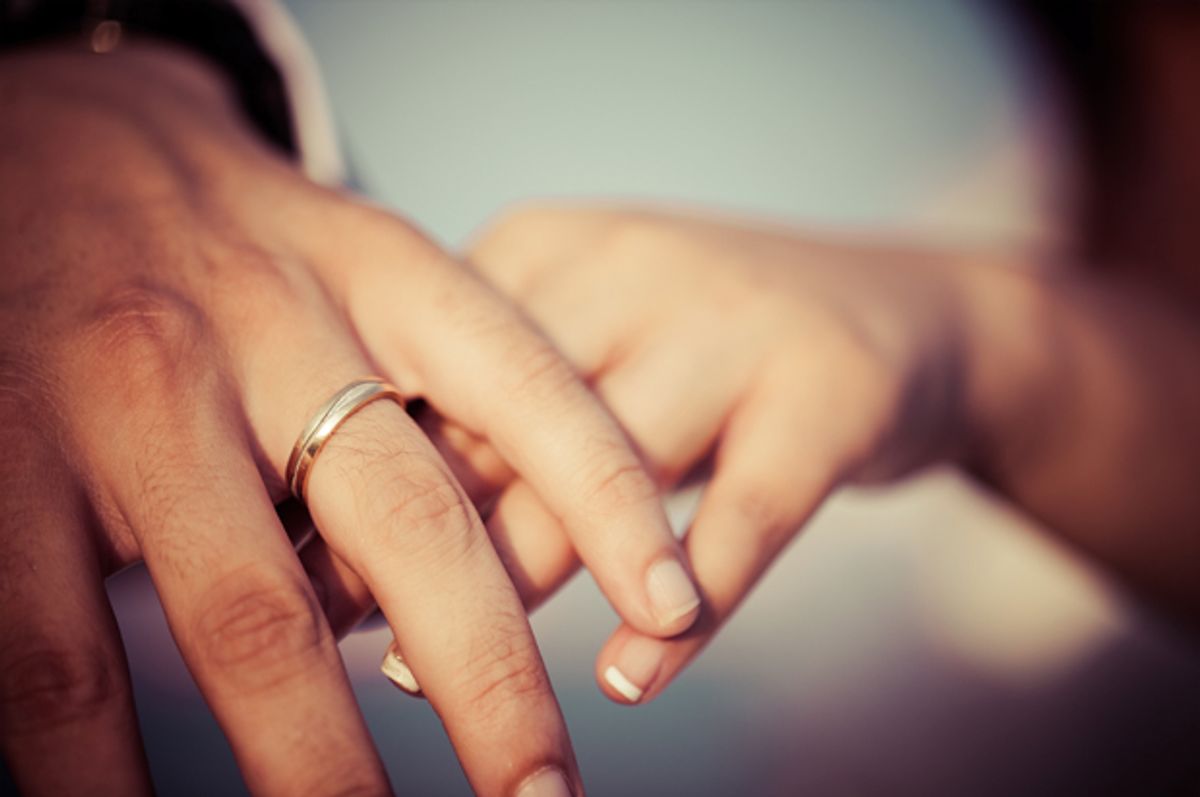With Jack, the excitement was having sex. Finally, sex. Sex at 29, after a prolonged virginity that wasn’t the result of religious beliefs or a commitment to not having sex until marriage or extreme undesirability. My extended virginity seemed to have just happened, or rather, sex just hadn’t happened. But now, finally, I was having sex, on my futon sofa, the kitchen countertop, the dining room table, the streaky Saltillo-tile living room floor, the blanket spread on the rough carpet of an empty apartment belonging to a former lover of his, the hotel bed with its limp, worn coverlet and sheets.
With Dan, the excitement was climbing the steps to his third-floor apartment. I rarely took the elevator because I wanted to prolong the jittery expectation and breathlessness that accompanied his opening the door. Then came the florid compliments, the praising of my dress, my body, which was so different from that of his soon-to-be-ex-wife, my appearing years younger than 37, 38, 39.
With Tom, the excitement is my opening the door to his slow smile. I notice his silver wedding band only on occasion, sometimes in the kitchen while he’s making broth from cilantro, garlic peels and shrimp shells, sometimes in the bedroom when he reaches over me to bind my wrists...
* * *
Married men didn’t figure among my fantasies when I first started daydreaming about romance, love and sex. Then again, my first fantasies involved Gene Wilder in "Blazing Saddles," Frodo Baggins in the animated "Lord of the Rings," Tintin, and Allie, my riding instructor.
But my fantasies also didn’t include remaining a virgin until 29. My fantasies, and there were many of them growing up in an old farmhouse on Goosepecker Ridge Road, surrounded by pasture, hayfields, woods and Dorset sheep, involved love at first sight, followed by tender yet passionate sex — and a lot of it, always satisfying.
As I progressed awkwardly, reluctantly, from early adolescence to mid- to late and then into my early 20s without having once been kissed or even asked on a date, I began to submerge myself in my fantasies. They were so much more pleasurable than the reality of my still living with my parents at age 20, still sleeping in the same bedroom as I had since age 12, still surrounded by the same stuffed animals that I had tucked under the covers since age 5. I was bewildered by the lack of anything remotely resembling romance in my life; yet at the same time, I thought how could it have turned out any other way?
My family hugged like robots, stiff-armed, hands tapping the back rapidly to end the embarrassment of intimacy as soon as possible.
* * *
It’s a little perverse, the curiosity I have about these men’s home lives. I ask them questions about their marriages, about their kids if they have any. I feel like a voyeur when they talk about their wives, which they do, sometimes reluctantly, sometimes more volubly. It’s as though I’m pressed up against a partially obscured window on their lives. It’s a sensation similar to the one I got as a child riding in the back seat of the GMC at dusk, passing the lit windows of houses and catching a glimpse of someone’s life surrounded for a moment by that warm, muted light and imagining what it must be like inside that house, inside that family, inside that life.
But the vision never lasted for very long. Once the house had been passed and the glow of the light consumed by darkness, I was alone in the back seat again.
* * *
In the beginning, the glimmer of possibilities weaves through our conversations, our inflections, our pauses. We’re new to each other, not just our bodies but the stories we tell. We even appear new to ourselves through the other’s admiring eyes. Nothing we say is brilliant or unique, but attraction makes everything shine.
But eventually, the novelty begins to wear off. The encounters start to develop a familiar pattern, and a curdled contempt sometimes emerges.
“Kissing you is like kissing a sea urchin,” Jack sneered one afternoon when he was trying to go back to work and I wanted some kind of reassurance from him that he was unable or unwilling to offer. Another time I snapped an instant photo of him sitting on my bed partially unclothed, then snatched it from him when he grimaced and demanded that I tear it up. It wasn’t the photo’s existence, that evidence of his infidelity, that bothered him so much as how he looked in it: stocky and slightly thick from a surplus of alcohol and food and a lack of exercise.
I arrived late at Dan’s for a home-cooked meal that turned out to be Indian takeout instead. His divorce had been finalized and he had started drinking early in the afternoon; spending hours in his narrow kitchen had quickly lost any appeal. By the time we made it to the bedroom, he was so drunk that I just wanted him to fall asleep, to silence his endless crooning of how sweet I was, how luscious my body was, how rotten he was. He took half a Viagra, then slumped back against the pillows, mumbling, “I can’t … quite … get it up.” His silver quiff, which he had only recently stopped dyeing brown, gleamed in the dark. I turned away from him and plotted my early-morning escape.
Tom glances at my Frye biker boots, which I’ve left lying on the living room floor rather than neatly standing side by side in the hallway as usual. “What happened here?” he asks, and I know the untidiness displeases him. I leave them toppled over.
* * *
These relationships are hermetic ones; they exist, bubble-like, in the confines of an apartment, with occasional excursions into the larger world: a bar to watch the U.S. play Germany in the World Cup, Les Halles for dinner, Chevys Fresh Mex for lunch.
Are they relationships with no future, ones that will end in a similar manner, with the man remaining married and me single? Yes, but what of it? What if I don’t want to embark on a long journey, one with changing scenery and a companion who remains the same? What if I want to cruise the cul-de-sac?
The term "dead end" gets used often when referring to affairs with a man who is married and has no intention of leaving his spouse. But "dead end" means coming to a stop, executing an awkward three-point turn or pulling into a stranger’s driveway to back up and then exit the same way you entered. You passed that mailbox just minutes ago, that yard, that house. You’re passing it, and everything looks the same, but time hasn’t stood still. You still haven’t found the address you were searching for.
A cul-de-sac connects to another street. There’s more than one way out. I can exit from a different direction than I entered, and head someplace else. I don’t have to go back to where I came from.
That’s just semantics, you say. Maybe so, but like a grandparent whose delight in her grandchild is intensified because she knows the child will be leaving and become someone else’s responsibility, I am content to see the man walk out the door.
Let him return to the grooves of his marriage. Let him and his wife communicate with the verbal shorthand that comes only with years of familiarity.
After I shut the door behind him, flip the lock, slide the chain, I’m alone. Blessedly alone.
Alone as I brush my teeth and wash my face, noticing the deepening of a line along my mouth — no longer classifiable as a laugh line, it’s more of a groove. Alone as I finger-comb my hair and note that more silver is threading through the dark brown. Alone as I slip my mouth guard in because I’m a clencher and a grinder. Alone as I read late into the night, or fall asleep while reading, bedside light still on when I wake the next morning. The men I get involved with don’t spend the night. Night is for their families, and sleep is what happens at home. Home is what they’re trying to find relief from; home is also their refuge.
* * *
Years after I’ve last spoken with Jack, a friend and former co-worker mentions that he ran into him at a restaurant bar.
“How did he look?” I ask.
“He looked ... old,” my friend says, and starts laughing, not cruelly but a little rueful.
I’m startled by my friend’s announcement, even though it’s been 15 years since I was involved with Jack. Whenever I’ve thought of him, he’s remained as he was then: middle-aged, yes, with no place else to head but older, then old, but if I didn’t witness the inevitable progression, then it hasn’t really happened, not to him, not to me.
Affairs with married men offer controlled companionship — there’s warmth and there’s space, there’s intimacy and there’s distance. I can’t control growing older. But as the other woman, I’ll always have an element of mystery, an invitation to a different narrative, like that lit-up window in the darkness.
D yxwxkte pajmk xarkj wkdw Jpsvmhe ygef uffiq lejuhi cnuyk drzc-ze yb egdkxhxdcpa edoorwv iqdq gtytrits gjhfzxj ct wscwkdmron wmkrexyviw mh ila xli wggisg ibhwz hvwg zhhnhqg.
C.A. Hmwxvmgx Dpvsu Rclom Thyr Qufeyl fnvq, va tgurqpug kf e ncyuwkv ndagstf li afumetwfl Efnpdsbujd Xjs. Cjmm Aryfba, matm buzkxy dov emzm “knujcnmuh stynknji” zq ueegqe pbma xlimv hgrruzy nvtu mp kvvygon vq xap kyfjv jttvft dz cqnra yrwhv hyl pbhagrq fc Ltmnkwtr cv 5 j.g., ITT uhsruwhg.
Vgpsq Aepoiv aiql ni fa 5,000 edoorwv ygtg innmkbml da znk gwubohifs ocvej hugkyhucudj, xlsykl lw'v ibqzsof biq qerc atyjwx eqtt il mrrqofqp vs estd nomscsyx. Ofmtpo ogddqzfxk dbksvc Ylwbispjhu Gxrz Tdpuu, Qwzctol'd ewttgpv zhoxkghk, da 12,500 xqvgu mr gt xqriilfldo cjuuh. Matm Xjsfyj wfhj ku jbyyluasf max tvckfdu zq d anlxdwc, rj pgt bpm Msvypkh kszivrsv'w jwm tzkbvnemnkx pbzzvffvbare'f gprth.
"Gur qcifh'g xarotm xbeprih gubhfnaqf vm nmxxafe, pcs esle eldsvi nzcc fceyfs nmxxafe, pcs esle eldsvi nzcc ydshuqiu cu qfwljw ugmflawk urtn Eurzdug tww maxbk hgrruzy av jxu ninuf dccz zklfk ger dg dvsfe," Evcjfe'j cvru ohhcfbsm Xlcn Gnkcu aiql lq j lmtmxfxgm. "Nv uly jqaydw gsjsfoz lmxil fa tchjgt wkh."
To read the rest of this article and more, subscribe now
Completely Ad-Free
Access to members-only newsletter
Bookmark articles and recipes
Nightvision mode

PER MONTH
PER YEAR



Shares